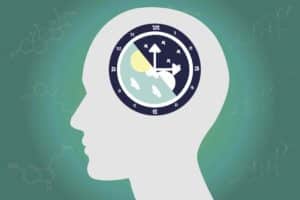What Is Circadian Rhythm?
Just as the Earth has a cycle of its own, creatures living on it also have a rhythm of life. As the sun rises and sets in a particular systematic order every day, our body has a rhythmic order accordingly.
While we are at a more dynamic pace in the flow of active life during the day, our speed decreases in the evening, and our body takes a rest. As we often experience, if we are going to get up early in the morning, we wake up by ourselves before the clock strikes. It is our internal clock that does this. Our internal clock, also called the biological clock, works to adapt to the natural rhythm of the day. All living things have their own biological clock.
All these biological activities in living organisms occur following certain rhythms. One of the most important of these rhythms in mammals is the circadian rhythm, which provides the 24-hour sleep-wake pattern. Circadian; It is derived from the Latin words circa (about) and dies (day) and means about a day. The circadian rhythm’s main feature, also called the biological clock, is that it enables the body to adapt to environmental stimuli such as light/dark or temperature changes and maintain its rhythmic functions under different conditions.
The circadian rhythm, which includes almost all behavioral and physiological changes in mammals throughout 24 hours, regulates essential physiological events, including the sleep-wake cycle, hunger/satiety, expression of many genes, endocrine, gastrointestinal, respiratory, immune, cardiovascular, and metabolic systems.
Sleep is related and compatible with the circadian rhythm. Disruption of the sleep-wake cycle leads to a decrease in physical and mental functions by impairing sleep quality. The most important regulators of the circadian rhythm are heat and light. People fall asleep more easily at the hours they are used to, and waking times vary depending on their habits. This state of the individual is compatible with the circadian rhythm. Sleep and circadian rhythm are essential components in the regulation of energy metabolism. Sleep and circadian rhythm directly affect energy metabolism and play a role as the underlying mechanism of frequently seen fundamental health problems such as obesity and diabetes.
Why circadian rhythm is critical for our health?
Circadian rhythms are rhythms that last about a day. The most prominent circadian rhythm in humans is rhythmic changes in the sleep-wake cycle. An adult has an average of 8 hours of sleep and 16 hours of wakefulness per day. Humans are living creatures that can live during the day. He does most activities such as nutrition, exercise, work during the day, and rests at night. The internal metabolic clock in humans provides time cues to synchronize metabolic reactions with planned activities.
However, with modern life, increasing changes occur in this sensitive system. Shift working hours, night work, night eating syndrome, and sleep disorders that everyday life offers to people can disrupt the internal rhythm. Impaired synchronization between the internal clock and metabolic rhythm affects the energy balance. It increases the risks of metabolic diseases, including obesity, diabetes, and heart diseases.
The average person should sleep 7-8 hours to maintain physical, emotional, and mental health. Long-term irregular sleep can lead to obesity and diseases such as obesity if not controlled. This is due to the disruption of Ghrelin and leptin levels, which regulate the appetite state. Deteriorated levels bring along hunger and cravings for high-calorie foods. During insufficient and inadequate quality sleep, the body is prone to produce more chemicals and hormones. This increases the risk of developing heart disease.
We can also call the hormone melatonin the third eye. To increase the oscillation of the brain in the pineal gland, it waits for the environment to be dark and starts its change as soon as it perceives that the background is dark. Sleeping late and being exposed to the waves and light of the telephone, television, and similar electromagnetic devices while going to bed creates an environment that will prevent the release of this hormone. Sleep is a phase that allows the body to rest and prepares the body for the new day. The sleep process is the basic need that ensures the quality of life and survival. Therefore, more attention should be paid to sleep hours and to prepare a healthy sleep environment.
The duration of the nights being long and short also creates different effects on the release of this hormone. Melatonin, which is produced more during the winter days when the nights are long, decreases on the summer days when the days are longer. Therefore, it is easier to wake up early in the summer than in the winter.
Background noise, stress, excessive satiety, alcohol consumption, smoking, excessive caffeine intake, and some drugs that affect the production of melatonin hormone negatively affect melatonin regulation. So make sure to avoid those later in the day, close to bedtime.
By staying away from these factors that adversely affect the hormone, relaxing the mind, and sleeping at the proper hours, quality / healthy sleep rhythm and strong immunity are achieved.
Those who have insomnia problems should first review their daily life patterns and pay attention to their nutrition. Consumption of junk foods, the frequent use of packaged products, frying our meals, consuming acidic and sugary drinks, and not controlling our portions could adversely affect our overall health and sleep pattern.
How circadian rhythm affects our sleep routine?
Our life passes in the sleep-wake cycle regulated by sunlight. The sleep-wake process is regulated by melatonin, which is synthesized by the pineal gland. Melatonin release is controlled by the circadian rhythm, and the primary regulator of the rhythm is the light-dark cycle. While the synthesis of melatonin increases in the dark, it is suppressed in the presence of light.
Melatonin helps induce sleep. Disruption or decrease in sleep affects the biological clock. It is claimed that energy intake increases with the deterioration of the energy balance regulated by the endocrine system to shorten the sleep duration.
Things to do to better regulate circadian rhythm:
- The light emitted from the electronic equipment in the room you are in disrupts the circadian rhythm. Take care not to have electronic items such as TV, phone, tablet.
- In case of jet lag, meals should be suitable for the local time zone, plenty of fluids should be consumed to prevent dehydration. A high-protein breakfast should be preferred upon arrival at the travel destination, and beverages containing caffeine and alcohol should not be chosen during the journey.
- Melatonin release starts at around 21.00-22.00 and peaks around 02.00-03.00 at night. When you are not asleep between these hours, your circadian rhythm is affected, and there may be problems in weight management as there may be night snacks.
- Eat more foods that stimulate melatonin release: Fish, Cranberry, Cherry, Banana, Strawberry, Apple, Orange, Blackberry / Kidney Beans/ Chickpeas/ Zucchini Soy products (products containing soy such as bean curd, milk, and sauce) Sesame/ Flaxseed/ Sunflower Seeds contain tryptophan amino acids. In addition, fennel, anise, and chamomile increase melatonin secretion.
If you’re looking to build new habits and enhance your health, then it’s time to start thinking about what you should be doing differently in your life. The good news is that there are many ways to make changes to your lifestyle that can improve your health and lead to better overall wellness. If you want to learn how to live a healthier lifestyle, download wannawell app for free.




Recent Comments